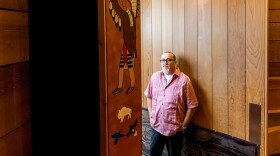More than a century ago, a Yakama Nation fisherman named Alec Towessnute was stopped while fishing near Prosser, and prosecuted for using a gaff hook, a traditional fishing method.
He cited his treaty rights, and the county court dismissed the charges. But the state Supreme Court, in 1916, reinstated them, ignoring the treaty and using racist, demeaning language.
In July, the state Supreme Court threw out that 1916 decision.
Justice Raquel Montoya-Lewis, who is an enrolled member of the Pueblo of Isleta and a descendent of the Pueblo of Laguna, is Washington state’s first Native American Supreme Court justice.
She https://youtu.be/mDD-zy573Vo" target="_blank">read the court’s unanimous order from the bench.
“I had a very visceral, emotional reaction to reading that [1916] decision,” she told KNKX. “I read it and I thought, ‘These are the people that are still on the walls of the Supreme Court, who never imagined someone like me being here, describing who I thought I was, who they thought my people were.’ It was very painful to read that.”
Montoya-Lewis was a Tribal Court judge for about 15 years prior to becoming a state Superior Court judge. She spoke to KNKX All Things Considered host Ed Ronco about her experience there, race and the law, and what it means to sit on the state’s highest court. Listen to their conversation through the audio player above, and read some selected quotes below:
INTERVIEW HIGHLIGHTS
On how the concept of justice can look different: “In one of the tribes, the idea of justice really meant making people whole. In another environment, the definition of justice was about the impact … on the community as a whole. What I learned from that is that if you really do have the flexibility to create a legal system that reflects your culture, reflects your language and beliefs, that system looks different. That gave me the freedom when I moved to Superior Court, and now into the Supreme Court, to have a much broader view of what courts can do.”
On how being both Native and Jewish informs her work as judge: “It is remarkable how much crossover there is between the two. In all the Native communities I’ve been part of, including my own, there is a strong belief in our responsibility to make the world a better place. That’s an action, not just something that you say. The way I did it was, of course, up to me. But I just assumed that the work I would do would be work that would make a difference in the lives of people in an important way.”
On being the first Native state Supreme Court justice: “I bring a different view, and that view is a view that none of the other justices on the bench have really heard, at least in the context of talking about cases. ... There was an article in Slate, that said Washington now had the most diverse Supreme Court in the country. Many people were rightly proud of that, but viewed it as sort of the end of the process. ‘We did it!’ It really isn’t the end. It’s the beginning.”







